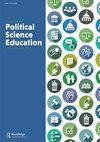国际关系导论课程研究
IF 0.6
Q3 POLITICAL SCIENCE
引用次数: 0
摘要
研究生助教(GTAs)在大型讲座课程中负责独立的部分,通常得不到足够的反馈。课程评估已经存在许多偏见,提供了学生对讲座和分组的综合反应,即使评论特别赞扬或批评分组教师。课程设计也有很大不同:有些教授会定期与他们的gta团队会面;其他人委托给领导GTA;许多人只是让他们的gta做任何能让学生说话的事情。相反,我们提倡以团队为导向的方法:课程研究。修改了科学教育中课程研究的使用,反过来又适应了在K-12教育工作者中流行的日本方法,我们专注于强调协作学习的指导,而不是讨人喜欢的调查。章节使用一个共同的作业,这有利于GTA参与设计和评估。小组提前开会确定共同的教学目标,并在课后再次进行汇报。洞察可能会导致在同一学期的后续作业中立即进行调整,或者在随后的学期中对原始作业进行修改。总的来说,这种方法集中在课程计划设计和交付的集体表达上,通过深思熟虑的实践,使教师和gta都受益。本文章由计算机程序翻译,如有差异,请以英文原文为准。
Lesson Study in Introduction to International Relations
Abstract Graduate teaching assistants (GTAs) who run independent sections for larger lecture courses typically receive insufficient feedback. Course evaluations, already flawed by numerous biases, offer an amalgam of student reactions to lecture and section, even when comments specifically laud or criticize section instructors. Course designs also vary greatly: Some professors meet regularly with their team of GTAs; others delegate to a lead GTA; and many simply let their GTAs do anything that gets students talking. Instead, we advocate a team-orientation approach: Lesson Study. Modifying the use of Lesson Study in science education, in turn adapted from a Japanese approach gaining popularity among K–12 educators, we concentrate on mentoring that emphasizes collaborative learning, rather than likeability surveys. Sections use a common assignment, which facilitates GTA participation in design and evaluation. The team meets in advance to confirm common pedagogical goals and again after sections to debrief. Insights may lead to immediate adaptations in subsequent assignments in the same term or revisions to the original assignment in subsequent semesters. Overall, this approach centers the collective articulation of lesson plan design and delivery through deliberately reflective practices that benefit both faculty members and GTAs.
求助全文
通过发布文献求助,成功后即可免费获取论文全文。
去求助
来源期刊

Journal of Political Science Education
POLITICAL SCIENCE-
CiteScore
1.80
自引率
36.40%
发文量
69
期刊介绍:
The Journal of Political Science Education is an intellectually rigorous, path-breaking, agenda-setting journal that publishes the highest quality scholarship on teaching and pedagogical issues in political science. The journal aims to represent the full range of questions, issues and approaches regarding political science education, including teaching-related issues, methods and techniques, learning/teaching activities and devices, educational assessment in political science, graduate education, and curriculum development. In particular, the journal''s Editors welcome studies that reflect the scholarship of teaching and learning, or works that would be informative and/or of practical use to the readers of the Journal of Political Science Education , and address topics in an empirical way, making use of the techniques that political scientists use in their own substantive research.
 求助内容:
求助内容: 应助结果提醒方式:
应助结果提醒方式:


